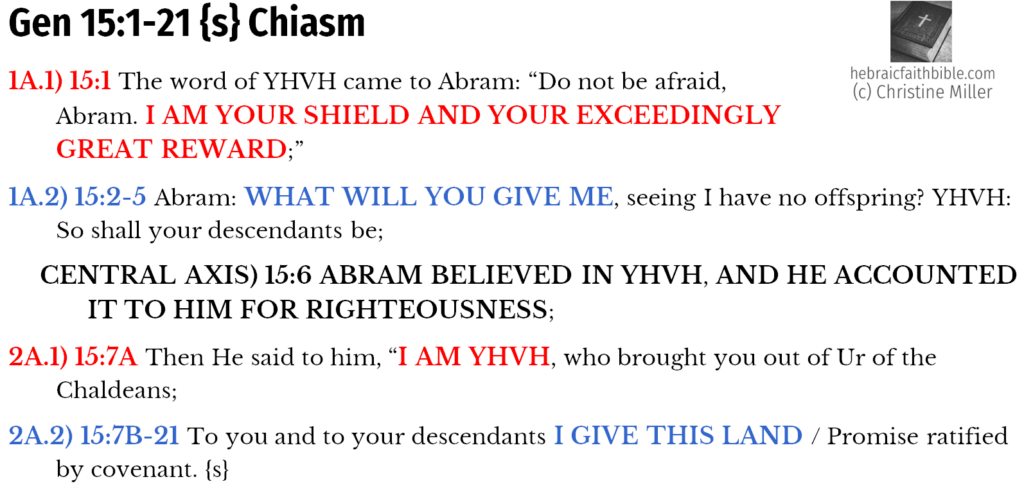Read Genesis 15:1-21 at Bible Gateway.
The teaching tools of scripture
Gen 1:1-2:3 and the teaching tools of scripture part one and part two
Gen 1:1-6:8 and finding the topic themes of scripture
Hebrew paragraph divisions
15:1-21 {s} Promise reaffirmed by covenant
Strong themes of the parashah
None this week
Gen 15:1-21 Chiastic Structure
Download the fully expanded Gen 15:1-21 Triennial B’mecheza chiasm pdf (Coming …).
Theme of the parashah
The promise reaffirmed by covenant
Finding Messiah in Torah
15:1-21 {s} Promise reaffirmed by covenant
A covenant is instituted through a sacrifice of a choice, fatted animal which is cut in two and the parties of the covenant pass through the pieces. If one party fails to meet the agreements of the covenant, then the other may do the same to them. Dr. Jeff Benner, Ancient Hebrew Lexicon, pg. 74
It is that the blood of the covenant may be avenged in the blood of the covenant breaker, that makes the blood covenant of the ancient world binding. This is why God cutting a blood covenant with Abram gave him the surety for which he was asking.
And he said, “Lord YHVH, how shall I know that I shall inherit it?” Gen 15:8.
God’s covenant with Abram is a special kind of blood covenant, a royal grant covenant:
Two types of covenants occur in the Old Testament: the obligatory type reflected in the Sinai covenant, and the promissory type reflected in the covenants with Abraham and David. It has been recently shown that the covenant between Yahweh and Israel was based in the treaty pattern prevalent in the ancient Near East, but no judicial prototype has been as yet found for the promissory type of the covenant. The author shows that the covenants with Abraham and with David are modeled on the “royal grant” so common in the ancient Near East. Gift of land and dynasty, the subjects of the Abrahamic and Davidic covenants, are most prominent in the suzerain-vassal relationship. Like the royal grant in the ancient Near East so the covenants with Abraham and David are gifts bestowed upon individuals who excelled in serving loyally their masters. The terminology used in this context is very close to that used in the grants. Especially characteristic are: “he kept my charge,” “walked before me in truth,” “his heart was whole to his master,” “walked in perfection.”
M. Weinfeld of Hebrew University, Jerusalem: The Covenant of Grant in the Old Testament and the Ancient Near East, Journal of the American Oriental Society, Vol. 90, No. 2 (Apr-Jun 1970), pp. 184-203.
Abram did not have an obligation in the covenant other than belief.
And he believed in YHVH; and He counted it to him for righteousness. Gen 15:6
The obligations of the covenant were all on God’s side. God is again teaching us about Messiah, in whose blood the renewed covenant was cut, in which the obligations of the covenant is all of Him and His work, while our part is to put our trust in Him.
Additional readings for this parashah
Zep 3:1-19 | Psa 11 | Rom 4:1-13
Studies in Triennial B’mecheza
Gen 15, Bible for Beginners
Gen 15:1-21, Belief reckoned as righteousness
Gen 15, And the cutting of the covenant
Gen 15 and 16, Abram believed God, from the ancient Hebrew pictographs
Further study off site
Ancient Hebrew Research Center – Dr. Jeff Benner
Living Word Pictures – Dr. Frank Seekins
What Language Does YHVH Speak? – Brad Scott on Truth2U Radio
Covenant – Jewish Encyclopaedia
Israelite Covenants in the Light of Ancient Near Eastern Covenants


















Leave a Reply